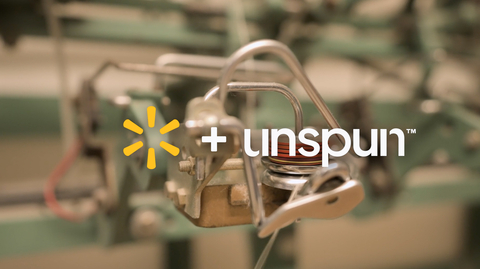Walmart and unspun Collaborate on 3D Fabric Weaving Technology, Aiming To Reduce Apparel Manufacturing Waste and Drive US-Based Manufacturing
-- Companies announce pilot project to explore first-of-its-kind approach to more quickly and efficiently convert yarn directly into garments --

Walmart and unspun work together to reduce the environmental impact of garment production. (Photo: Business Wire)
The pilot project directly addresses concerns about waste in the apparel industry – a significant global challenge – driven primarily by fabric loss from traditional flat weaving, cutting and garment assembly, and from discarded extra inventory built to meet growing consumer demand and fashion trends. These issues, combined with the emissions generated from transporting garments and fabrics supplied offshore, have created demand for more sustainable apparel manufacturing supply chain solutions.
“At Walmart, we are laser-focused on bringing innovation to our supply chain to better serve our customers and solve industry challenges, and unspun has the potential to do just that,” said Andrea Albright, executive vice president, Sourcing, Walmart. “The technology we are piloting with unspun has the potential to unlock more skilled job creation in the
Pilot Will Examine 3D Weaving for Pants
In the pilot project, the two companies will explore how unspun’s 3D weaving machines can be used to make workwear style pants under a Walmart house brand. With 3D weaving, yarn is spun directly into completed garments. This is an innovative and new approach to garment manufacturing. Traditionally, yarn is woven into one-dimensional fabrics, which are then cut and assembled into garments – creating waste and taking significant time and multiple manufacturing steps. The 3D weaving process is different from commonly known 3D printing, which creates a physical object from a digital design by laying down thin layers of liquid or powdered plastic, metal or cement.
The two companies aspire to deepen the collaboration into later phases should the pilot prove successful. unspun, in collaboration with a manufacturing partner, hopes to ultimately deploy additional microsites around the
“The pressing need to address ongoing climate change, reduce carbonization and drive to more transparent and localized apparel manufacturing practices is at the heart of our mission,” said Beth Esponnette, co-founder of unspun. “We have been running low-volume production of commercial products at our first micro factory with proven third-party life cycle assessments to back the impact of this new type of production. Now, together with Walmart, we see an enormous opportunity to take our innovations to scale, with the potential to disrupt the garment manufacturing industry, bring jobs to the
"unspun's technology aims to be the fastest, highest quality and most economical way to make woven garments period. Innovative industry leaders like Walmart are beginning to see the future potential impact, and we expect there to be continued interest as the unspun team builds the future of manufacturing," said Shuo Yang, Lowercarbon Capital.
Shaping the Future of Retail
Today’s announcement closely follows a series of innovative tech initiatives unveiled by Walmart in recent months. On Jan. 9, 2024, at the Consumer Electronics Show (CES) in
A long-time leader on sustainability, Walmart has worked with suppliers, NGOs and climate action leaders to inspire positive change across global value chains since 2005. In its own operations, Walmart has set a goal to be powered
About unspun:
Founded by Beth Esponnette, Walden Lam and Kevin Martin, unspun is a fashion and technology company with a mission to revolutionize garment production and reduce waste in the fashion industry. They have pioneered Vega™️, the world's first 3D weaving technology, which efficiently transforms yarn into garments. By implementing Vega™️ in microfactories, unspun aims to disrupt traditional fashion manufacturing, eliminate the requirement for large order quantities and decrease transportation emissions and lead times. unspun’s technological capabilities and vision for the future of fashion have landed the company on the Vogue 100 innovator's list, Newsweek’s Climate Change innovators, TIME's Best Inventions, Fast Company's World-Changing Ideas and a B-corp certification. To learn more about unspun, visit https://www.unspun.io.
About Walmart
Walmart Inc. (NYSE: WMT) is a people-led, tech-powered omnichannel retailer helping people save money and live better - anytime and anywhere - in stores, online, and through their mobile devices. Each week, approximately 255 million customers and members visit more than 10,500 stores and numerous eCommerce websites in 19 countries. With fiscal year 2024 revenue of
View source version on businesswire.com: https://www.businesswire.com/news/home/20240314778881/en/
Source: Walmart Inc.








